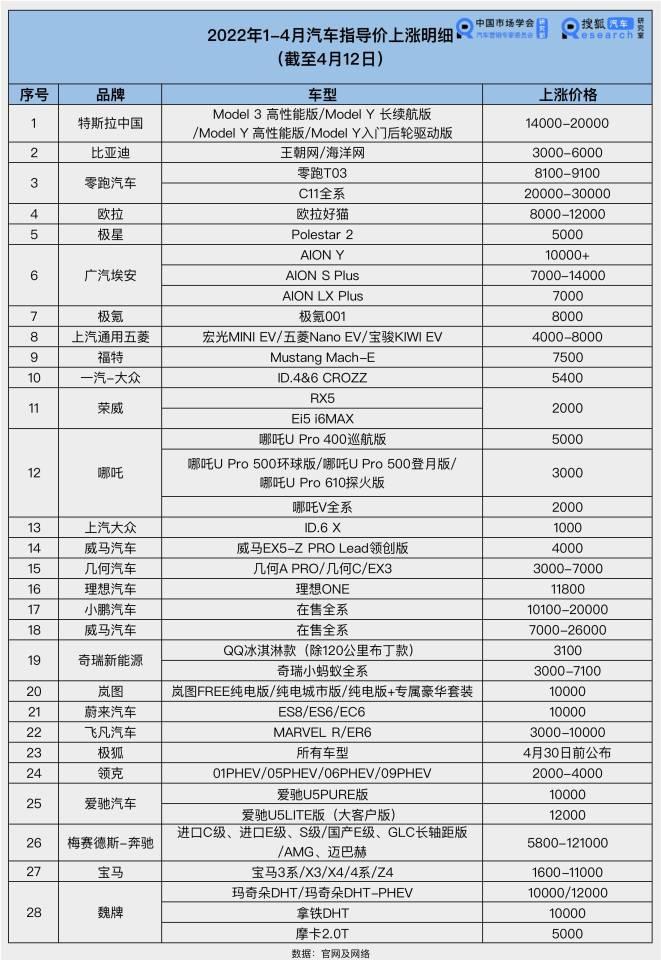The "price increase tide" pioneered by new energy vehicles has gradually spread to the field of fuel vehicles.
According to statistics from Sohu Auto Cafe, as of April 12, a total of 28 car companies have announced price increases this year. Before April, the price increases were all based on new energy vehicles; but since April, three car companies have raised the price of fuel vehicles.

On April 12, the car café learned from BMW China's official website that BMW raised the price of its products in China, involving the price and configuration adjustment of five models of BMW 3 Series, X3, X4 Series and Z4, with prices rising by 1600-11000 yuan.
At noon on the same day, Weipai, a brand of Great Wall Motor, issued an announcement that Weipai would adjust the official guidance price of some models on sale in the coffee series, raising the range by 5,000-12,000 yuan. Among them, the overall price of Mocha 2.0T was raised by 5,000 yuan, and the adjusted price was 192,800-228,800 yuan.
These two companies have also become the latest companies to follow the rise after Mercedes-Benz launched the "first shot" of fuel vehicle price increases.
Earlier, in early April, Mercedes-Benz announced that it would make adjustments to the retail prices proposed by some of the manufacturers of the models on sale. It covers a variety of models of Maybach, AMG and other sub-brands, as well as Mercedes-Benz CLA, E-class, GLC, S-class and other models. Depending on the model, the increase ranges from 1,000 yuan to 121,000 yuan.
From luxury brands such as Mercedes-Benz and BMW to independent high-end brands Weipai, a fact presented by the adjustment of the price of many fuel vehicle products is that the price increase of raw materials is transmitted to the fuel vehicle, but the price increase of the fuel vehicle has not been completely resolved by the dealer link.
In recent months, "new energy vehicle price increases" have continued to become a hot topic. Under the influence of factors such as subsidy decline, chip shortage, and raw material price increases, new energy vehicles have opened multiple rounds of price increases, covering various price segments, involving more than 20 enterprises such as Tesla, BYD, Wuling, Weilai, Ideal, Xiaopeng, Geometry, Zero Run, WM, and Lantu.
Compared with new energy vehicles, fuel vehicles on the spotlight do not seem to have collectively increased their prices, but in fact, they have long begun to narrow the preferential margin through dealers to digest the rising costs caused by the price increase of raw materials.
According to data provided to the car café by Cui Dongshu, secretary general of the National Passenger Car Market Information Joint Association, in early April, from July to November 2021, the comprehensive promotion rate of fuel vehicles decreased by 2.8 percentage points; since November, the promotion range of fuel vehicles has been greatly reduced, ranging from 5,000-8,000 yuan; by January and February this year, the promotion rate remained at 9.7%, while the promotion range of the same period last year remained at about 12%.
However, companies still say that the pressure brought about by the price increase of raw materials is huge. As the first independent brand to announce the price increase of its fuel vehicle products, Weipai explained in the announcement that the price increase was affected by the price increase of upstream raw materials, chips and core components.
The car café also learned from Weipai earlier that Weipai has been thinking about this price increase for a long time, mainly because the cost is too high.
"I really can't hold back." Weipai CEO Li Ruifeng said after the price increase was announced, "The subsidy slope can still stand up, the chip shortage can still survive, even if we have been enduring losses, we have not passed it on to users and dealers." But now not only the cost of chips and battery materials continues to rise, but also the prices of steel, rubber and aluminum alloys are rising. ”
It is worth noting that in addition to the Chinese market, luxury car brands such as BMW and Mercedes-Benz have launched a round of price increases in many markets around the world.
According to foreign media reports, Peter, director of finance and China affairs of BMW Group, said that due to the rising cost of global raw materials such as rhodium, palladium and steel, the price of all BMW models in Germany and other parts of Europe will rise by about 3%. Peter also said that BMW's overall manufacturing costs could increase by $1.2 billion due to the increase in raw material costs.
In the Indian market, Mercedes-Benz and BMW have started price increases for all models since April 1, with adjustments of less than 3% and 3.5% respectively.
Mercedes-Benz explained in the price increase notice at that time, "Rising raw material prices, global supply chain shortages, and increasing logistics costs have all put tremendous pressure on the company's overall costs." ”
In addition, Audi has raised prices in the Australian market in February this year, ranging from A$600 to A$7,600.